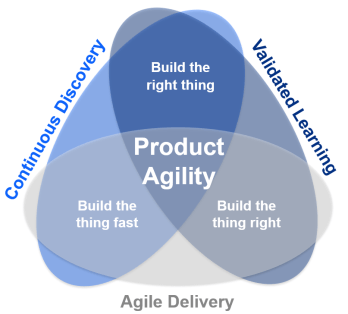
December 14, 2021
In the digital world,
the faster you fail the sooner you succeed

How quickly are you turning your failures into success?
Failure is not an outcome it’s a waystation on the learning highway. Too many success-obsessed organizations treat failure as an end point rather than a learning experience that provides feedback and knowledge that help future experiments succeed.
A new study from Northwestern University’s Kellogg School entitled “Quantifying dynamics of failure across science, startups and security” found that “how you fail (and try, try again) determines if you’ll eventually succeed.
Their study documented that what ultimately determines success is what they learned from previous failures and how they applied that knowledge going forward. If they use the lessons to improve future attempts, it will lead to eventual success. If they have too few failed attempts or they fail to incorporate the lessons learned, they will find themselves on a path to permanent failure.
As Dashun Wang, Associate Professor at Kellogg and head of the study said, “Failing fast isn’t just prescriptive; it’s diagnostic. If you’re not failing faster and faster, you’re in stagnation region and not gaining enough feedback to form intelligent improvement.”
A very recent McKinsey Global Survey with 1,290 respondents, two-thirds of those companies pursuing business transformations said that their organizations were just treading water, taking no decisive action, and consequently achieving little or no business impact.
Learning at the rate of discovery

A recent HBR article entitled “Good Leaders Are Good Learners” found that leaders in a learning mode benefited by adopting a “growth mindset” that allowed them to experiment with alternative strategies and approaches to problems and to use postmortems to learn from the results of these experiments. This approach allowed these leaders to be more agile in adapting to changing environments as well as to be more innovative in approaching new challenges.
Jeff Bezos has built Amazon around learning on a massive scale via experimentation. As he said, “if you double the number of experiments you do per year, you are going to double your inventiveness.”
Speed to market and time to value are the new metrics for competitive success. New product lifecycles have shrunk from years to quarters to months to weeks to days to hours. Those organizations that have successfully adapted to this new cadence are continually distancing themselves from the competition.
Developing and deploying systems of engagement and systems of intelligence enable companies to match their speed of learning to their speed of discovery.
Prioritize progress over perfection

In the digital world, there is a strong motivation to find the definitive “killer app” that tops the competition. While the goal is admirable, achieving it often takes way too long and thus misses its market opportunity.
By contrast, adopting a Minimum Viable Product (MVP) development process allows companies to launch an early version of their offer and get real time feedback from early users as to what they need to change and add to make it better. The major benefit from an MVP is they learn what they don’t know or didn’t anticipate their customers responses would be to the product. This approach allows them to prioritize progress over perfection.
Amazon CEO, Jeff Bezos, believes that “most decisions should probably be made with somewhere around 70% of the information you wish you had. If you wait for 90%, in most cases, you’re probably being slow.” He believes the risks of seeking perfection outweigh the risks of making a wrong decision especially if you can learn from it and quickly respond to real time customer feedback.
Making good decisions in an era of hyper-adoption and hyper-abandonment

Good decisions start with good questions. In his recent book, The Book of Beautiful Questions, author Warren Berger makes his case for the power and value of good questions. “Having strong questioning skills has always been important. But in a time of exponential change, it’s a twenty-first century survival skill.” He goes on to say that “questions enable us to organize our thinking around what we don’t know so our discovery process can uncover what we need to know.”
Not having all the information you’d like before you make a decision greatly increases the fear of failure and puts an even greater premium on asking the right questions up front. Here are some “courage questions” to overcome the fear of failure from Warren Berger:
- What’s the worst that could happen?
- If I did fail, what would be the likely causes?
- How could I recover from that failure?
- What if I succeed – what would that look like?
- How can I take one small step into the breach?
This approach allows leadership teams to clearly communicate the options/choices the company will pursue and not pursue and explain why. It also enables the company to focus on what it’s really good at and cut back on the rest.
There is no playbook that you can study that provides the right answers to all the unknowable outcomes of the current age of digital disruption. As such, learning faster than the competition is the only sustainable competitive advantage. This requires that CEO’s and their senior leadership teams embrace and endorse the value of failing fast to succeed sooner. These are the leadership skills and capabilities that will determine which companies succeed and which companies fail.
As always, I am interested in your comments, feedback and perspectives on the ideas put forth in this blog. Please email them with me on linkedin. And, if this content could be useful to someone you know please share it here:



